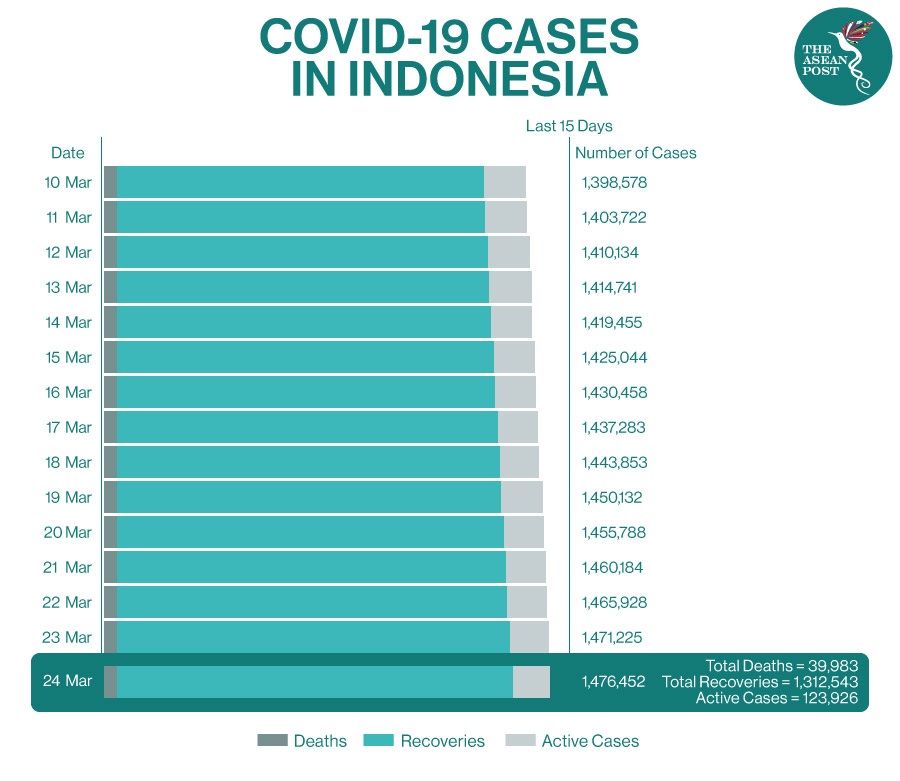The health officials were racing against the clock. Doses of the coronavirus vaccine had to reach Sabang, a city on the mountainous Weh Island in the Andaman Sea, by that afternoon. It was early February, and Indonesia was falling behind on its plan to vaccinate health workers, a crucial step in one of the world's most ambitious immunisation campaigns.
The vaccines, made by China’s Sinovac Biotech, travelled three hours by plane from Jakarta to Banda Aceh but had four hours to go via ferry and armoured truck to reach the distribution centre.
Indonesia, which has recorded 1.5 million cases of COVID-19 and 40,000 deaths, pivoted in recent months from containment to inoculation, betting that vaccines could help reopen the economy, relieve hospitals and protect people across the vast archipelago.
But the first phase of the Sinovac drive in Aceh, the westernmost province of five million, has been derailed by misinformation, mistrust and geographical and practical constraints.
“We need at least two million doses per day (across Indonesia) if we want to finish the vaccination drive by next year,” said Dicky Budiman, an epidemiologist at Griffith University in Australia, many times the current rate of 400,000 a day.

Slow Vaccination Pace
In January, Indonesia began rolling out its plan to vaccinate 180 million of its 270 million people, after a late-stage Sinovac trial of 1,600 people in the country showed an efficacy rate of 65.3 percent. The full data has not been published in a peer-reviewed journal or made public by Sinovac, usually a prerequisite for regulatory approval. A Brazilian trial of more than 12,000 health-care volunteers revealed an efficacy rate of just 50.4 percent.
Indonesia has secured commitments for about 330 million vaccines, including 125.5 million doses of Sinovac’s CoronaVac, 50 million doses each from Oxford-AstraZeneca and Pfizer-BioNTech, 50 million from Novavax and 54 million doses from the World Health Organization (WHO). Only CoronaVac has been distributed so far, with health workers, civil servants and senior citizens first in line.
But at the current pace, it would take Indonesia 10 years to reach its goal. Health Minister Budi Gunadi Sadikin said officials should be administering one million doses a day but did not elaborate on the capacity to expand the program.
Scepticism
Indonesia has also struggled to convince its people to get the shots. A survey by local pollster Saiful Mujani Research and Consulting in December found 23 percent of respondents believed the vaccines were unsafe. Another survey of 1,200 respondents by research centre Indikator Politik Indonesia in February found 55 percent would refuse the coronavirus vaccine.
Public scepticism was evident when the Sinovac doses finally made it to Sabang, guarded by a motorcade of police tactical vehicles and men armed with AK-47s.
“As if we would steal the vaccines,” said Abdullah, who runs a kiosk selling cigarettes and other small items. Abdullah, who like many Indonesians goes by one name, does not plan to get vaccinated.
Fitriliani, a 26-year-old restaurant owner, had no idea about the vaccination program.
“I think there’s no virus here,” she said. “So why do we need vaccination then?”
A survey by the WHO, UNICEF, Indonesia’s Health Ministry and the Indonesian Technical Advisory Group on Immunisation in September involving more than 100,000 respondents in all 34 provinces found that Aceh had the lowest acceptance rate, at 46 percent.
To assuage doubters, Indonesia’s highest clerical body signed off on the vaccine as halal. But the move has had little impact in Aceh, a deeply religious and conservative region of this mostly Muslim country. Many there said prayer would be the answer.
Misinformation
While authorities stress that vaccine side effects, such as fatigue and fever, are mostly mild and temporary, many people here worry about serious after effects, thanks to disinformation and vague official messaging.
For many in Aceh, there is simply no urgency. The province implemented lockdowns and curfew last April but reversed them after a week.
For many here, the coronavirus appears to be a distant memory. Public spaces remain open, and most people do not wear masks. Schools resumed early this year. Many believe simply exercising will help keep the virus away.
Aribowo Sasmito, co-founder of the Indonesia Anti-Slander Society, a non-profit myth-busting organisation, said disinformation has played a role in stymieing the take-up.
One anti-vaccine Facebook group, the Anti-Vaccine and Immunisation Movement, has nearly 2,800 members. In the “About” section, site administrators cite passages from the Quran to justify their beliefs that God has provided humans with enough natural resources to fight off illnesses.
“We have good Internet penetration in some regions, but it wasn’t combined with critical thinking; what we see is a massive influx of hoaxes,” Sasmito said. “Good messaging is crucial at this moment.”
This article was first featured on 24 March, 2021 on The Washington Post.
Related Articles:
